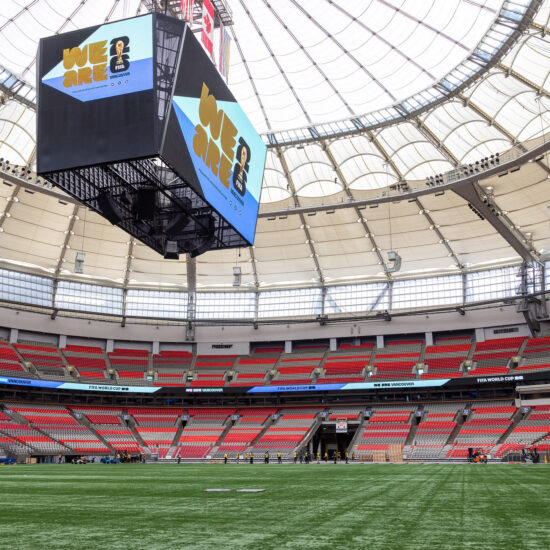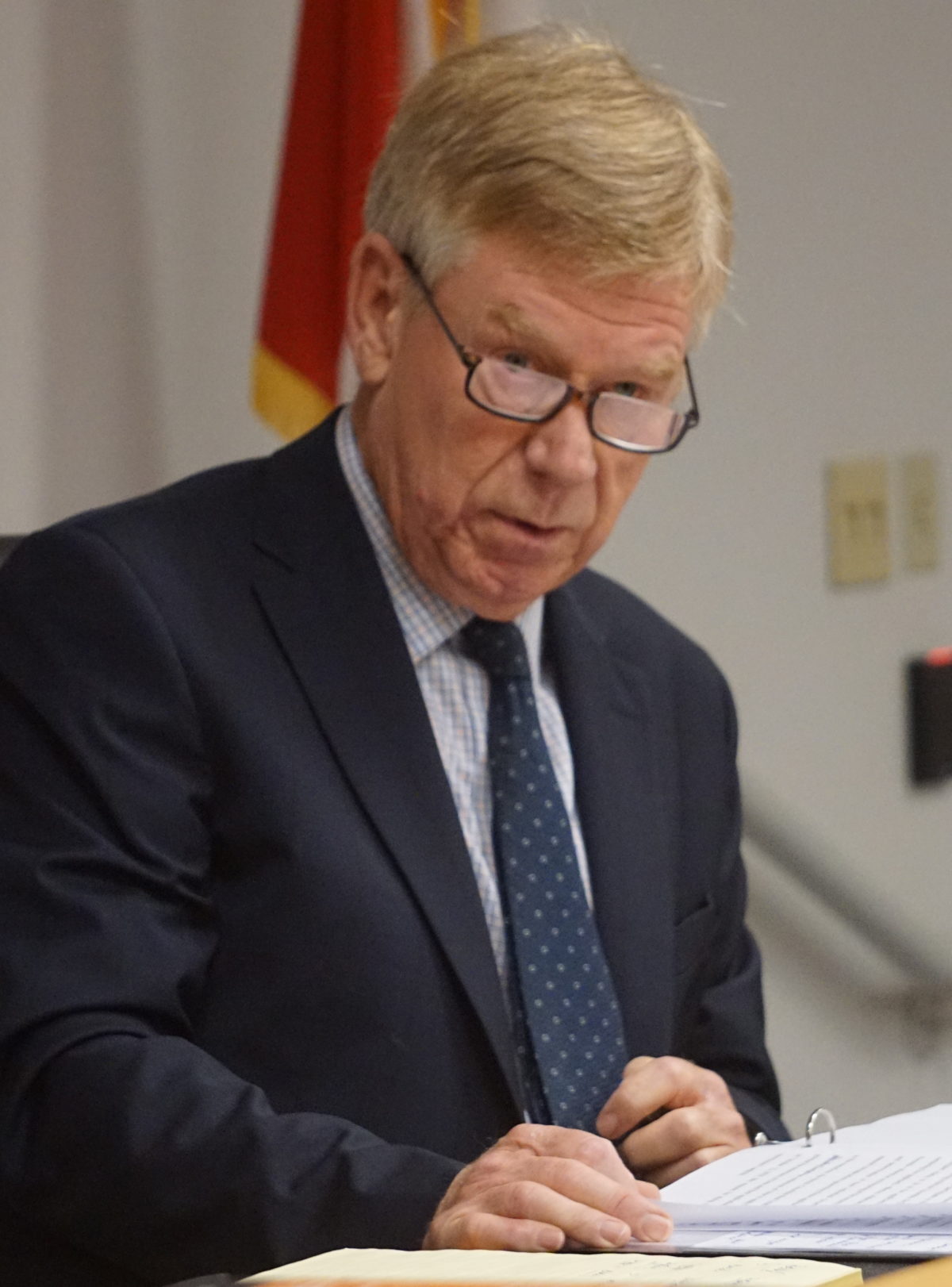
Bob Mackin
The virtual public inquiry into money laundering in British Columbia is now over.
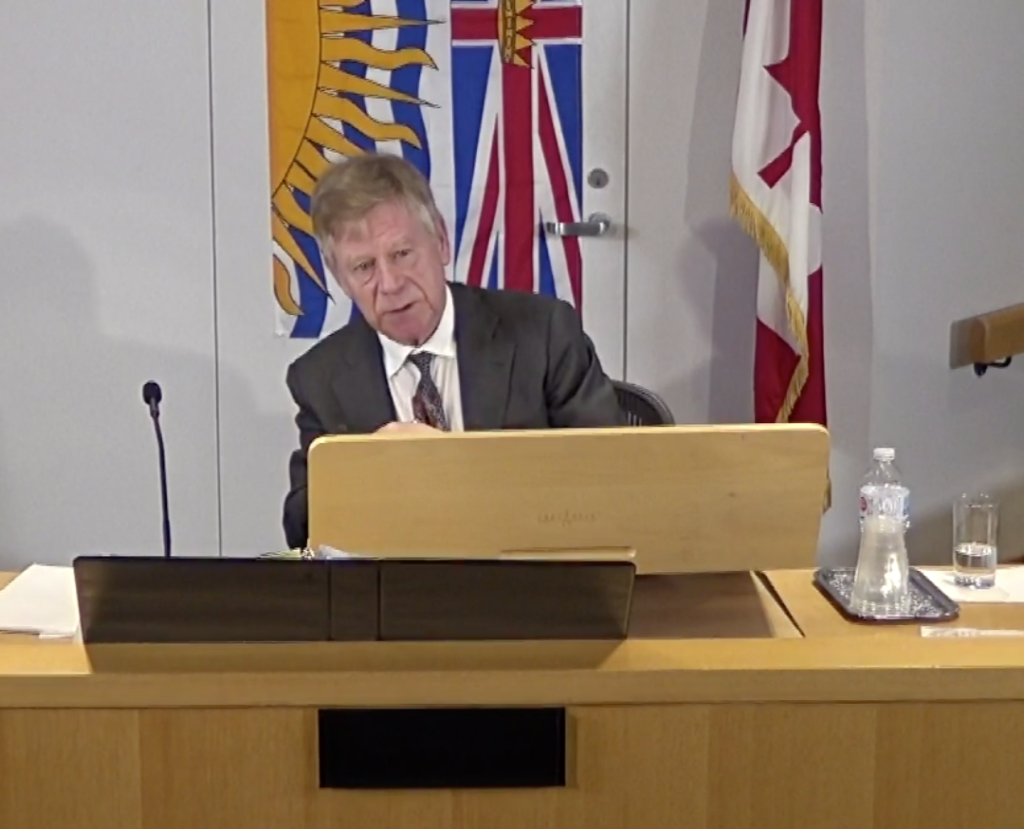
Commissioner Austin Cullen (Cullen Commission)
Justice Austin Cullen signed-off for the last time on Oct. 19, after replies from lawyers for the Governments of Canada and British Columbia, and the B.C. Lottery Corporation. Even Greg DelBigio, the lawyer for accused loan shark Paul King Jin, the poster boy for the inquiry, had one last chance to defend his client.
But it’s not over until it’s over.
“There is still much to be done for the commission and myself,” Cullen said.
Now we wait. Cullen has until Dec. 15 to write his final report and recommendations and deliver it to the NDP government for release on a day to be announced.
“What I hope will be a success that will bring some reason and rationale to the issues that confront us,” Cullen said.
How it started
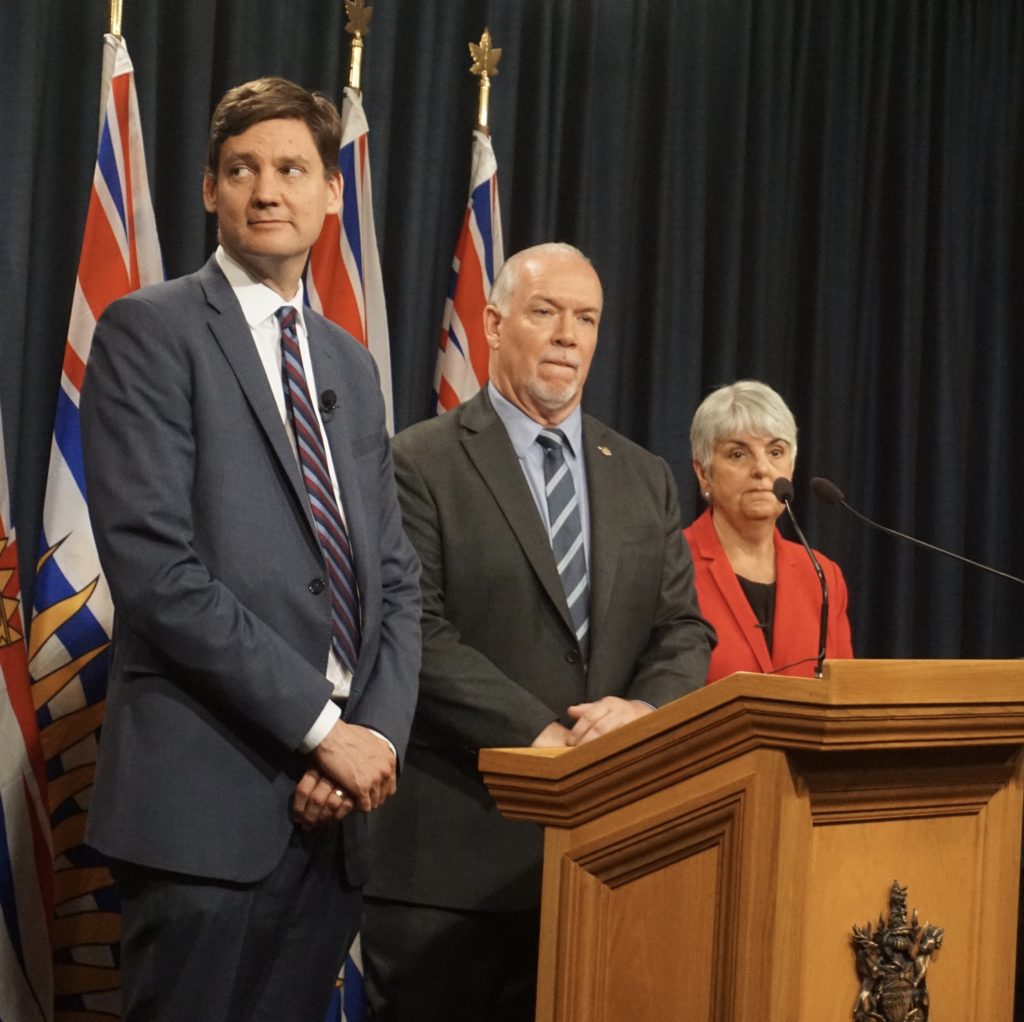
David Eby (left), John Horgan and Carole James, May 15 in Victoria (Mackin)
Premier John Horgan, Attorney General David Eby and then-Finance Minister Carole James bowed to public pressure and announced the public inquiry on May 15, 2019, with a final report deadline of May 2021.
That was supposed to be six months before the next provincial election.
Testimony began Feb. 24, 2020, as the coronavirus was spreading.
When it reconvened in late May 2020, it was via webconference, due to the pandemic. And it would stay that way to the end.
The fall 2020 sessions were delayed two weeks, until after the snap election Horgan called. No surprise, there was an extension granted March 19, 2021, but a hard deadline for Cullen of Dec. 15, 2021.
Horgan was initially reluctant. He had expressed reservations that the inquiry would cost a lot, make lawyers rich and end up with a final report that sits on a shelf and gathers dust.
A little known-fact: Before he ran for public office in 2005, Horgan was a lobbyist in Vancouver for the Plaza of Nations casino and for the controversial installation of slot machines at Hastings Racecourse.
By the numbers
Cullen heard 198 witnesses over 138 days.
Another 23 gave evidence by affidavit.
There were 1,063 exhibits, more than 70,000 pages of documents and he made 36 procedural rulings.
Highlights
Peter German (April 12-13, 2021)
The former head of the RCMP in Western Canada whose two Dirty Money reports set the table for the inquiry. German painted the picture for how B.C. became a money laundering mecca.
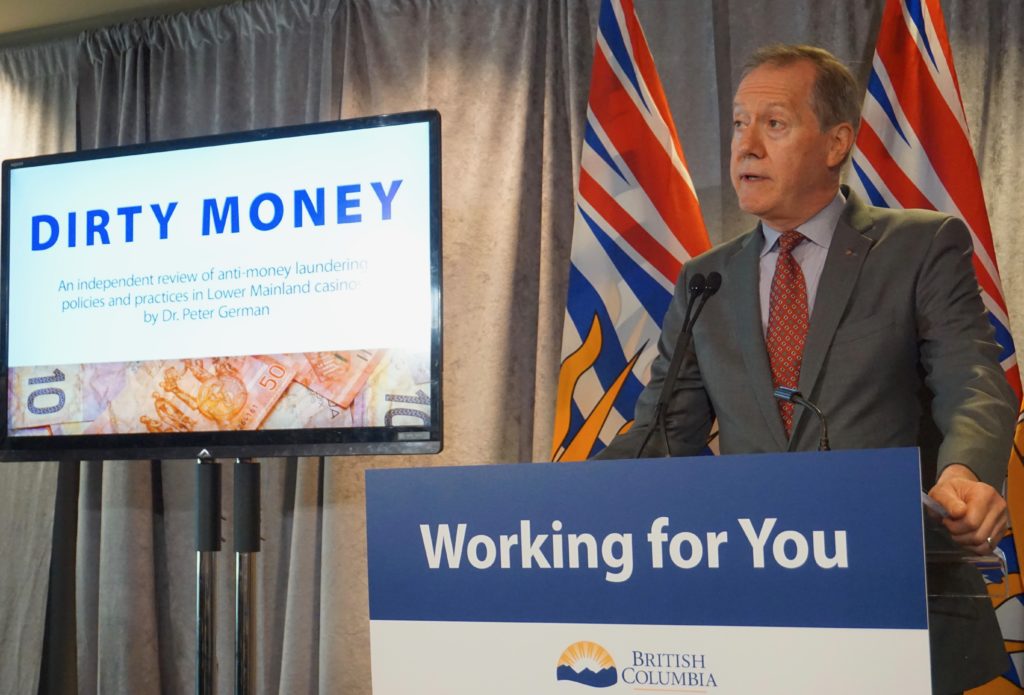
Peter German’s Dirty Money report was released June 27 (Mackin)
“We are in many ways an Asian-looking city. We look to Asia, our commerce is to Asia as well as to the United States. Everybody in the Lower Mainland lives within probably an hour of the US border. There’s a lot of north/south movement and including to Mexico these days with visa access being what it is. And all of this is COVID aside, if you get my drift. So you’ve got a large port, you’ve got a large airport, among the largest on the western seaboard of North America. We are a high-tech location here in Vancouver and British Columbia. We have excellent financial systems. We have excellent communication systems. We’re really well situated and we’re — it’s a prosperous economy. We also have a really ethnically diverse province and city, which is really, I think, one of the things that makes it so appealing to live here in terms of culture, ethnicity and everything else. We are quite unique.
“On the flip side of this, organized crime sees all these reasons as well.
“All of those issues that make this a great place to live also make it quite attractive, in my opinion, to organized crime.”
I could go over each of those again, but you can sort of put it together. It’s the easy access in terms of ports, airports, United States, Asia. We’re very well situated. Add to that the fact that we have a very fair and, I would say, small L liberal criminal justice system. We don’t lock people up and throw the key away. I spent four years as a Deputy Commissioner of federal corrections. I’m quite familiar with our penitentiary system, and we have a parole system that is top class in terms of the world. But for organized crime, the downside isn’t all that great if you end up going to jail. You’re probably not going to go for long, and that’s a reality. We’ve also made it very difficult in recent years — and this isn’t the work of any one person but through a collection of circumstances — very difficult to investigate financial crime in this country. It’s not easy, and I’m happy to go into that in some detail.
“So you put that together and then add to it that we have a fairly, again, small L liberal culture when it comes to drug use. A lot of drugs are consumed in this part of the country, not to say that they aren’t consumed elsewhere as well, but it just makes us very attractive to organized crime.
“And where you have organized crime, you have money laundering.”
Ross Alderson (Sept. 9-10, 2021)
The former B.C. Lottery Corporation anti-money laundering manager blew the whistle. Without him, there probably would not have been an inquiry.
He was one of the last to testify. He explained why he risked his job.
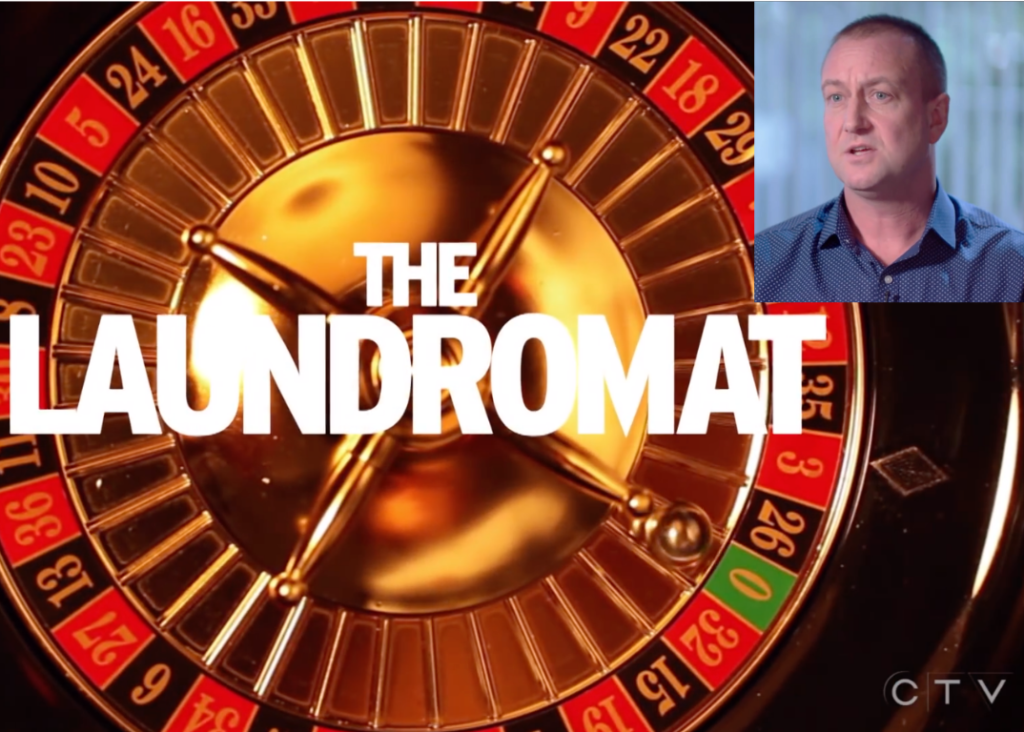
Whistleblower Ross Alderson featured on CTV’s W5 (CTV)
“I saw nothing being done. Nothing being done. And the more I got involved, I joined — I became on the board of directors of the certified anti-money laundering group in Vancouver, and I saw how many of these patrons were linked into real estate transactions, into other transactions that these were people with criminal links, and I was getting information from police, and not only that, some very concerning links to the Chinese Communist Party, and I felt that a lot what was being undermined — I mean, I lived in Amsterdam when I was 22 years old. It was the first time and I was a country boy from New Zealand who really had my eyes opened about drug problems.
“But when I came to Vancouver and I would drive from Vancouver head office to the downtown area to go to my meetings, I would drive through Hastings and Main, and what I saw down there, you know, you know, it just — you don’t see too many places in the world. It’s disgusting. And I — I just — the whole thing to me was distasteful, and I felt that I was in a position that I had the information that this needed to be out in the public forum and that was my frustration.”
The former vice-president of Great Canadian Gaming was key in attracting Asian high roller junkets to River Rock Casino Resort in Richmond, the epicentre of B.C. casino money laundering.
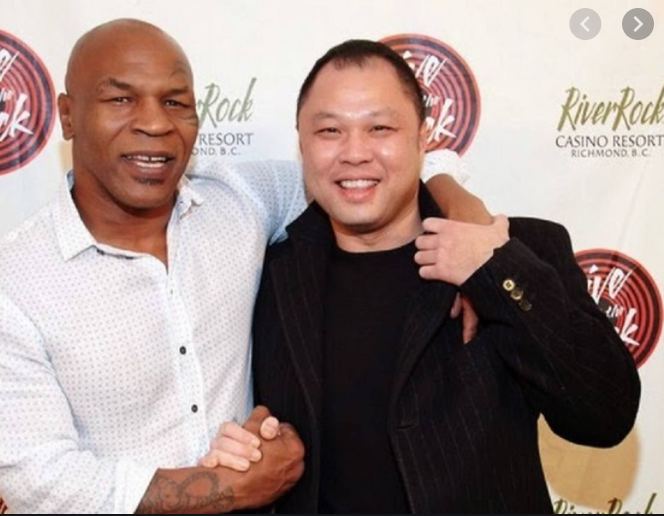
Ex-Great Canadian Gaming VP Walter Soo with Mike Tyson
“But in another twist of fate what happened was SARS happened in 2002. The people of Macau, the people of Hong Kong, Hong Kong particularly, blamed the Chinese government for covering that up and that SARS was hitting southern China and affecting them.
“The Chinese government as part of the damage control allowed the borders to be open from China to Macau, China to Hong Kong to repair any damages done by that period. And when that border opened the Chinese people gushed into Macau. And again, the Chinese people immigrated to Vancouver, now ready, stocked and prepared to play, and for years overlapping from 2005 to 2012, these people just kept flowing in. They just — it may sound crude, but they just washed up onshore.”
Christy Clark (April 20, 2021)
The former Premier, under whose watch casino crime and real estate prices ballooned. Her BC Liberal Party held many fundraisers at casinos and took donations from casino companies. (If the commission lawyers had fact-checked her testimony, they could’ve investigated her for perjury.)
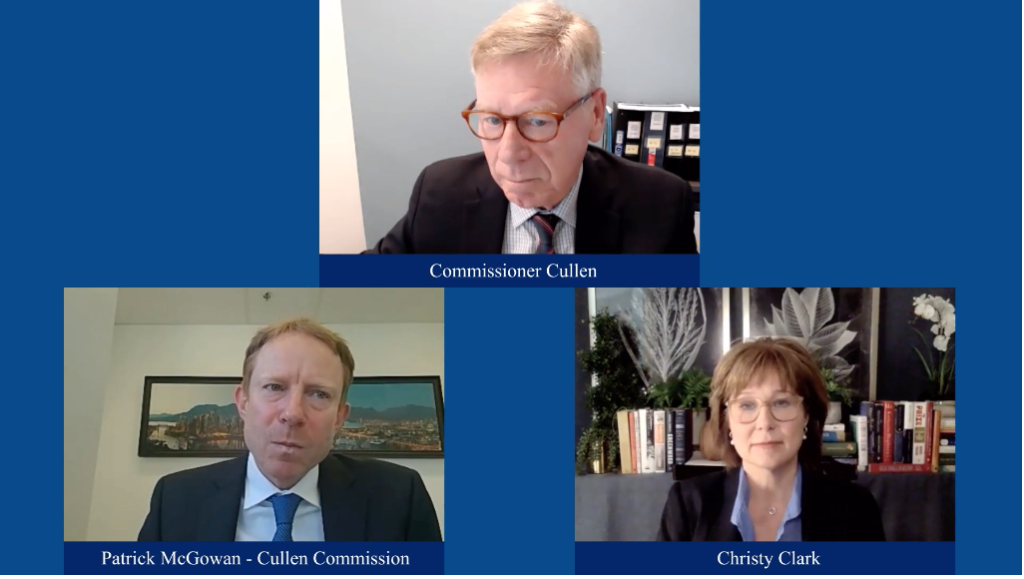
Christy Clark testified April 20 at the Cullen Commission (Cullen Commission)
“Well, government, you know, political parties still to this day take donations from organizations and businesses across the province that we regulate. So forestry companies donate to political parties. That’s a regulated business. Mining as well. Liquor companies, also regulated. I mean, you could go right across — pharmaceutical companies, also regulated. So, I mean, there’s a lot of — that exists right across government, so, you know, it’s not unique to gaming by any stretch of the imagination. And, you know, but, again, most donors give money to all the political parties they’re allowed to. For the most part they weren’t allowed to give it to the BC Liberal Party.”
Shortfall
The inquiry was supposed to probe money laundering in all its forms, from casinos to real estate to cars to currency and stock trading… who knew what and when. But in the end, it became a probe of casinos.
The Cullen Commission was patterned after Quebec’s Charbonneau Commission, the public inquiry into construction industry corruption. That was a four-year quest for truth that led to the resignation and conviction of two mayors. It exposed secrets about Montreal’s mafia and SNC-Lavalin.
Who didn’t testify
Former BC Liberal Premier Gordon Campbell
Former Vancouver Mayor Gregor Robertson
Robertson’s chief of staff Mike Magee
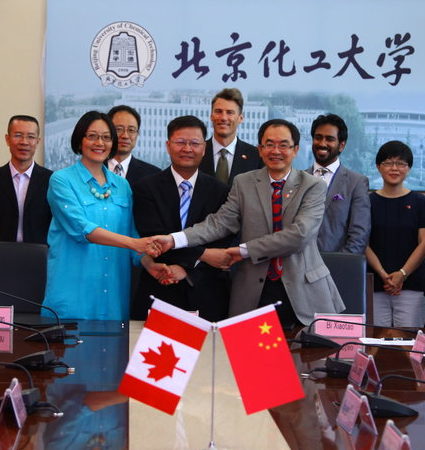
Joan Elangovan (second from left) in Beijing in 2017 with Mayor Gregor Robertson.
Former Vancouver City Managers Penny Ballem and Sadhu Johnston
Richmond Mayor Malcolm Brodie
Former Burnaby Mayor Derek Corrigan
Former Burnaby Coun. Richard Chang
Vancouver Police Chief Adam Palmer
Former Vancouver Police Chief Jim Chu
BC Liberal campaign manager and casino lobbyist Patrick Kinsella
Great Canadian Gaming ex-CEO Rod Baker
Real estate tycoon Peter Wall
Real estate tycoon Ian Gillespie
Real estate marketer Bob Rennie
BC Liberal fundraiser, former BCLC chair and Paragon Gaming director Richard Turner
Accused money launderer Paul King Jin
Gambler and People’s Liberation Army veteran Rongxiang “Tiger” Yuan
Online gambling pioneer and cryptocurrency magnate Calvin Ayre
Liberal Senator Larry Campbell
Trudeau-appointed Senator Yuen Pau Woo
Former Liberal MP and real estate lawyer Joe Peschisolido
Investor/stock fraudster Paul Oei
Real estate and immigration lawyer and former China state council lawyer Hong Guo
Support theBreaker.news for as low as $2 a month on Patreon. Find out how. Click here.










